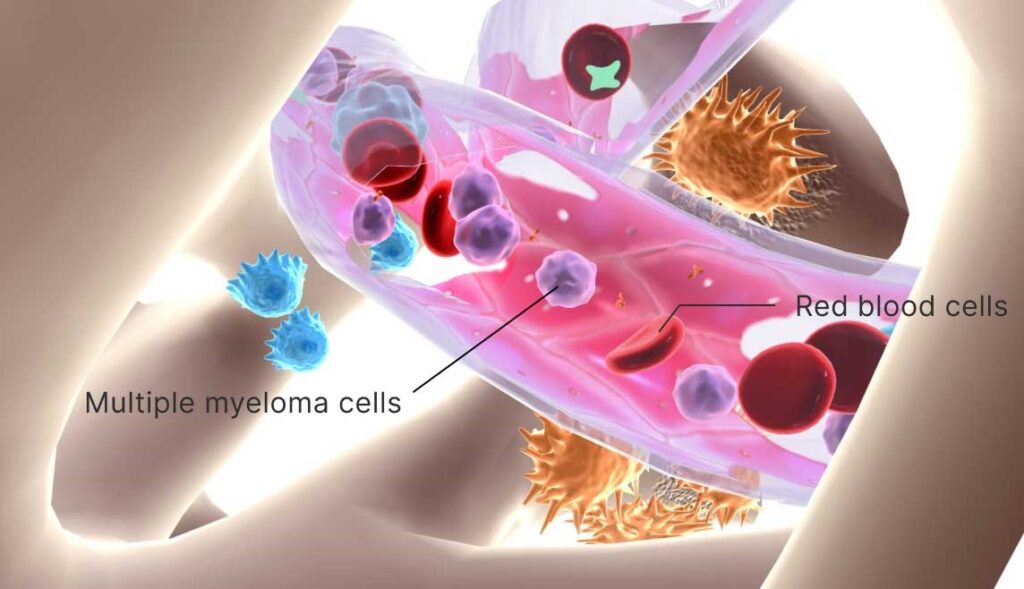
People with multiple myeloma often feel better when they eat regularly and get adequate nutrients. They also may need to modify their diet because of the side effects of certain medications.
Eating well can reduce multiple myeloma symptoms and treatment side effects, support bone health, help maintain a healthy weight and keep people strong enough to participate in clinical trials.
Dietary Assessment and Individualized Plans
As myeloma progresses, patients may suffer from a wide range of complications such as severe pancytopenia (low blood cells), bone destruction with the development of lytic lesions in the bones, and hypercalcemia (high calcium levels). These diseases may lead to weakness and fatigue.
Treatments for multiple myeloma have improved significantly in recent years. Although the prognosis for patients with standard risk myeloma is still poor, many patients are able to live a long time with the disease.
Staging: Physicians use a combination of blood tests and a bone marrow biopsy to determine the stage of multiple myeloma. This information helps them predict which treatments will be most effective in controlling or putting the disease into remission.
However, every patient with multiple myeloma is unique. Individual survival varies widely, depending on a variety of factors, including the stage of their disease, genetic characteristics, and response to treatment. These factors make it difficult to provide specific life expectancy estimates for people with multiple myeloma.
Maintaining Adequate Caloric Intake
While there is no proof that diet can cure multiple myeloma, a good nutrition plan can reduce treatment side effects and help people feel their best. It can also aid in recovery from surgery and/or other traditional therapies for the disease, support bone health, and improve quality of life.
Some myeloma treatments can decrease appetites, but it’s important to eat small meals throughout the day so that you are getting adequate nutrients. Try to avoid processed foods and instead focus on fresh, whole foods, such as fruits and vegetables, grains, low-fat dairy products, lean meats, and sources of healthy fats like olive oil and nuts.
It’s also important to limit alcohol and caffeinated beverages, as they can worsen certain myeloma treatment side effects, such as nausea and vomiting. A registered dietitian can help with specific dietary guidelines for your myeloma treatment journey.
Protein-Rich Diet for Muscle Preservation
A nutrient-rich diet can help reduce symptoms and side effects of multiple myeloma, improve strength, boost the immune system, and support normal weight. Eating a well-balanced diet can also help patients feel their best and increase their energy levels.
Treatment for multiple myeloma and related procedures can deplete nutrients and cause weight loss. People can help maintain adequate nutritional intake by eating small, frequent meals throughout the day and focusing on protein-rich foods such as lean meats, fish, eggs, soy products, yogurt, cottage cheese, and a variety of vegetables and fruits.
Many myeloma treatments can affect kidney and bone health, and they can also cause gastrointestinal issues, which can make it challenging to consume enough calories and protein. A registered dietitian can help individuals with myeloma and other chronic conditions develop a personalized diet plan that is safe during treatment and afterward.
Hydration and Electrolyte Balance
As multiple myeloma progresses, cancer treatments can have an impact on kidney function, which can result in elevated potassium and phosphorus levels. To help prevent these symptoms, it is important to communicate with your medical team and stay aware of blood work results. If you find that you have high levels, try to avoid foods that are high in potassium and phosphorus (see ingredients list).
Drinking enough fluids is also crucial for nutrient transportation, joint health, blood pressure regularity, and more. In many cases, it is best to stick with water, or low-sugar drinks like diluted fruit juice or coffee.
Many of the medications used to treat multiple myeloma can cause nausea and vomiting, making it hard to eat well. Try to eat when you can and choose bland foods that are easy on your stomach. If you have trouble eating or drinking enough, talk with your registered dietitian about possible options for hydration and electrolyte balance.
Vitamin and Mineral Supplementation
Vitamins are organic compounds used by the body in small amounts for many metabolic processes. Vitamins are best obtained from a diet of whole, unprocessed foods. When using supplements, it is important to follow recommended dosages on the product label. High doses of some vitamins can be harmful.
Multiple myeloma is a blood cancer that forms in bone marrow and causes cancerous plasma cells to build up, leading to anemia, kidney damage and bone weakness. Multiple myeloma also speeds up the breakdown of bone, causing pain and increasing the risk of fractures.
Research has shown that patients with MM who are treated with chemotherapy can benefit from vitamin D, folic acid and probiotics (bacteria) supplementation. Certain dietary foods can also provide anti-myeloma benefits, including green tea extract and a compound called pterostilbene, which can be found in blueberries, pomegranates and turmeric. However, it is important for MM patients to avoid certain dietary supplements and herbs that may interfere with the effectiveness of their treatment. These include cruciferous vegetables and some herbal remedies. Seek a naturopathic provider or a dietitian with experience working with cancer patients to choose the right nutritional supplements.


